Man Arrested for Begging in Nova Gradiška, Sentenced to Prison
February 11th, 2022 - The Croatian justice system is said to be slow and ineffective, but it sure acts swiftly in some cases.
A 28-year-old man named Petar was declared guilty and sentenced to prison for having begged for money in front of a Konzum store in Nova Gradiška.
Petar was asking passersby for money in November last year. The judge sentenced him to five days in prison, and the money he had earned that day was confiscated, 24sata reports.
It’s described in the verdict that the beggar was ‘standing at the front door, holding out the palm of his left hand with some coins, begging citizens who were entering or leaving [the store] for money, saying he had no income or anything to eat, eliciting compassion from citizens.'
The court declared him guilty of committing a violation of the Act on Misdemeanors against Public Order and Peace, which classifies the act of begging as a misdemeanor punishable by fine or up to 30 days in prison. Petar must report to prison when summoned by the court, when the verdict becomes final.
It is also said in the verdict that the proceeds of the misdemeanor in the amount of HRK 84.30 are to be seized from the defendant and must be paid into the State Budget of the Republic of Croatia within 15 days.
Petar also has to reimburse the costs of misdemeanor court proceedings in the amount of 100 kuna; failure to do so will result in enforcement proceedings. He did not appear in court, did not send a defense lawyer to represent him, and did not inform the court of a change of address.
A police officer who was questioned in the proceedings said that on the day in question the citizens reported that the man was begging in front of the entrance to Konzum.
He described going to the site of the reported misdemeanor and finding Petar in front of the entrance with the outstretched palm of his left hand containing the coins he received from citizens.
The police officer added that Petar was invoking his difficult living conditions in order to elicit compassion.
‘I found 84.30 kuna in coins on the defendant which he received from citizens. I confiscated them and they were paid into the state budget. The defendant often begs at Konzum and in the passage near the open market’, the officer said.
Croatia Last in EU as to Perceived Independence of Justice System
ZAGREB, 9 July - 2021 - The perceived independence of the national justice systems in the EU is worst in Croatia, Slovakia and Poland, according to a justice scoreboard the European Commission published on Friday.
According to a 2021 Eurobarometer survey, Croatia is last in the EU according to the perceived independence of its justice system, while Slovakia, Poland, Bulgaria, Italy, Spain, Hungary and Slovenia are slightly better.
The perceived independence of the national justice system is best in Austria, Finland, Germany and Luxembourg.
In Croatia, 68% of respondents among the general public cited interference or pressure from government and politicians as the main reason for the perceived lack of independence of courts and judges, 63% cited pressure from economic or other specific interests, and 50% said the status and position of judges do not sufficiently guarantee their independence.
Croatia also came last in the perceived independence of the national justice system among companies.
Poland, Italy, Slovakia and Hungary placed above Croatia, while Finland, Denmark, the Netherlands, Austria, Ireland and Luxembourg had the best scores.
Croatia and Italy have the largest numbers of pending cases in civil and commercial cases, although Croatia has the largest number of judges per capita after Slovenia.
When it comes to the time estimated as necessary to solve civil, commercial, administrative and other cases in Croatia, that was 130 days in 2019, 102 in 2018, 114 in 2017 and 133 in 2012.
The waiting was longest in Cyprus, 882 days in 2019, followed by Portugal and Greece, 860 and 677 days respectively in 2012.
Denmark scored best, with only 19 days of waiting in 2019, followed by Latvia (25 days), Estonia (32), Lithuania (52) and Slovenia (56).
For more news, CLICK HERE.
Courts Rarely Process Sexual Harassment in the Workplace - Survey
ZAGREB, 10 May (Hina) - More than 71 percent of those employed in Croatia have experienced sexual harassment in the workplace, in most cases, they have been women, and there is an increasing number of complaints, however, they are still rarely processed by the courts, a survey presented on Monday shows.
The courts are not sensitized to process cases of sexual harassment in the workplace, partially because of the poor and confusing legislative framework with four laws that cover that area. Victims often aren't aware that this is a criminal offense and don't know either whom to or how to report that they have experienced sexual harassment, gender equality ombudsman Višnja Ljubičić said presenting the survey results.
The survey was conducted by an independent expert for combating violence against women, Dunja Bonacci Skenderović, on a sample of 448 people, 16 years since the last similar survey was conducted in Croatia by the ombudsman's office.
The latest survey, although it was not conducted on a representative sample, indicates that three in four women and half the men experienced sexual harassment in the workplace and that in 61% of the cases the abusers were their superiors.
The explanation for such a high percentage of men is the fact that only 32 men completed the questionnaire. The survey also lacks gender segregation which would show whether that 50% of men were harassed by women or other men.
Gender-conditioned harassment
"In order to be able to talk about gender-conditioned harassment, it needs to be said that 60% of women were harassed exclusively by men while it is unclear who harassed the 50% of men," said Ljubičić.
As far as reports of sexual harassment of men are concerned, her office has received only one complaint by a man who was harassed in the education system by his school principal, while several men reported they were harassed because of their sexual orientation.
"Men who were sexually harassed because of their sexual preference were harassed by other men and not women," underscored Ljubičić, adding that it is important to supplement this survey.
The majority of victims of sexual harassment in the workplace keep that a secret. As many as 83% of those surveyed had not reported these cases due to lack of confidence in their employers that anything would be done after they reported it, said Bonacci Skenderović and underscored that sexual harassment in the workplace is a criminal offense.
The Criminal Code is currently being amended with regard to sexual harassment which, Ljubičić said, should in future treat it as gender-conditioned violence. Court proceedings will be launched ex-officio based on reports made to the police and the statute of limitations will no longer be limited to three months, but ten years instead, she said.
For more, follow our lifestyle section.
European Commission Criticizes Croatia Over Corruption
ZAGREB, Sept 30, 2020 - The European Commission criticizes Croatia over corruption and says that its fight against corruption is insufficient, however, the Croatian justice system has made progress on reducing backlogs.
The first annual report on the rule of law in the European Union's member states, which the EC released on Wednesday, covers the following four pillars: Justice System, Anti-Corruption Framework, Media Pluralism, and Other Institutional Issues related to Checks and Balances.
The country chapter on Croatia includes serious objections to the Anti-Corruption Framework.
"Croatia has the legal and policy framework to promote integrity and prevent corruption in the public sector broadly in place. A network of authorities contribute to anti-corruption policymaking across all branches of government," reads the report.
"However, shortcomings remain both in the legislation and practices to combat corruption. Important initiatives to strengthen ethics and integrity amongst top executive functions and Members of Parliament and to regulate lobbying remain unimplemented. Corruption remains of particular concern at the local level due to structural weaknesses in the integrity framework for local office-holders and the management of local State-owned companies."
The report notes that on 18 September, the Croatian Justice and Public Administration Minister announced a new Anti-Corruption Strategy for 2021-2030.
Justice system: Progress in reducing backlogs
The Croatian justice system is praised for having made progress in reducing backlogs and improving electronic communication in courts.
The system, however, "is still experiencing serious efficiency and quality challenges."
"The State Judicial Council and the State Attorney’s Council, autonomous and independent bodies, are facing challenges to adequately fulfill their mandate due to a lack of sufficient resources as well as the fact that their role in selecting judges and state attorneys has been reduced."
The centralized postal delivery of court documents is a positive example of saving resources in courts.
Media pluralism
Croatia's legal and institutional framework guarantees media pluralism.
The regulator Agency for Electronic Media "functions transparently, but it is not entirely shielded from political influence in relation to the selection procedure of the members of its governing body."
"The rules on transparency of media ownership ensure a solid system of ownership notification to the authorities and the public, but the identification of the beneficial owner can be problematic.
"Recent years witnessed a high number of lawsuits against journalists, threats of physical attack and online harassment, which may have an impact on the editorial policy of media companies and on the work of investigative journalists," reads the Croatian country chapter.
System of checks and balances
The system of checks and balances is supported, among others, through online tools for consultation of the public and other stakeholders, and by a People's Ombudsperson and an Information Commissioner competent for protecting the right to access public information.
For the latest travel info, bookmark our main travel info article, which is updated daily.
Read the Croatian Travel Update in your language - now available in 24 languages
Entrepreneurs Do Not Trust Croatian Justice System
June 30 - UGP conducted several surveys among its members on the topic of the justice system. The results are devastating, but unfortunately, expected. The slow and inefficient judicial system is also, according to entrepreneurs, one of the main problems of Croatian society. The UGP believes that legal reform should be one of the first reforms of the new Government.
One of the UGP's postulates is #morejustice, and one of the reforms we requested from the Croatian Government applies to the Croatian justice system. Even though the trust in the justice system is generally on a low level, it seems like it is also a more significant stumbling block for entrepreneurs and a barrier in the business.
For this reason, we asked entrepreneurs more questions to process the topic better and try to find out where all the reasons for such deep dissatisfaction lie.
The first question was, "What is the role of the judicial system in the exercise of entrepreneurs' rights?" Only 0.5% of respondents think that the system helps significantly, as it should. The same number of respondents think exactly the opposite: the justice system substantially makes things worse, 0.5%. Very few, 1.4% think that the justice system moderately helps, making the overall positive perception under 2%. 17.7% think that the justice system does not help entrepreneurs. The largest category, 80% of respondents say, "Come on, please..." which suggests that the condition is so bad that there is no point in answering the question on any positive impact. This level of resignation is the first sign to raise the alarm.

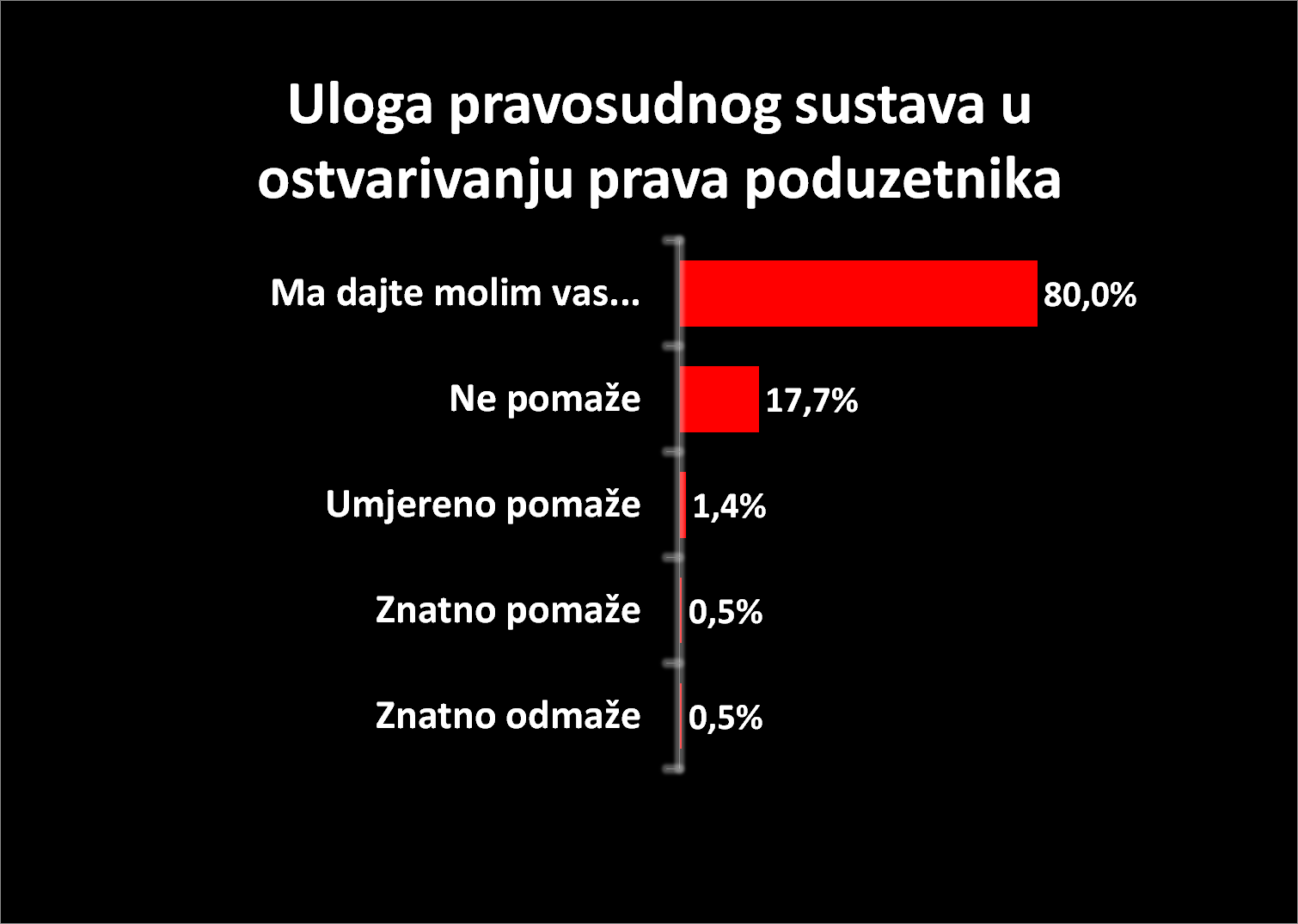
The second question was about the length of litigations, given that both the viability of the business and the survival of the firm can often depend on it. We received responses about the duration of legal proceedings that our members conducted or are conducting: only 2.2% say the proceedings lasted under two years, which we consider a reasonable deadline. Another 5.9% said that the procedures lasted for a somewhat acceptable 2 to 5 years. The most significant number of votes — 47.8% — went to the answer "more than five years." This time range doesn't make much sense in the business context. Up to 33% say that the procedures lasted more than ten years, which is entirely unacceptable.
The latest information is that almost 11% say they had or still have proceedings going on for more than 20 years! We don't even know how to comment on this last part.
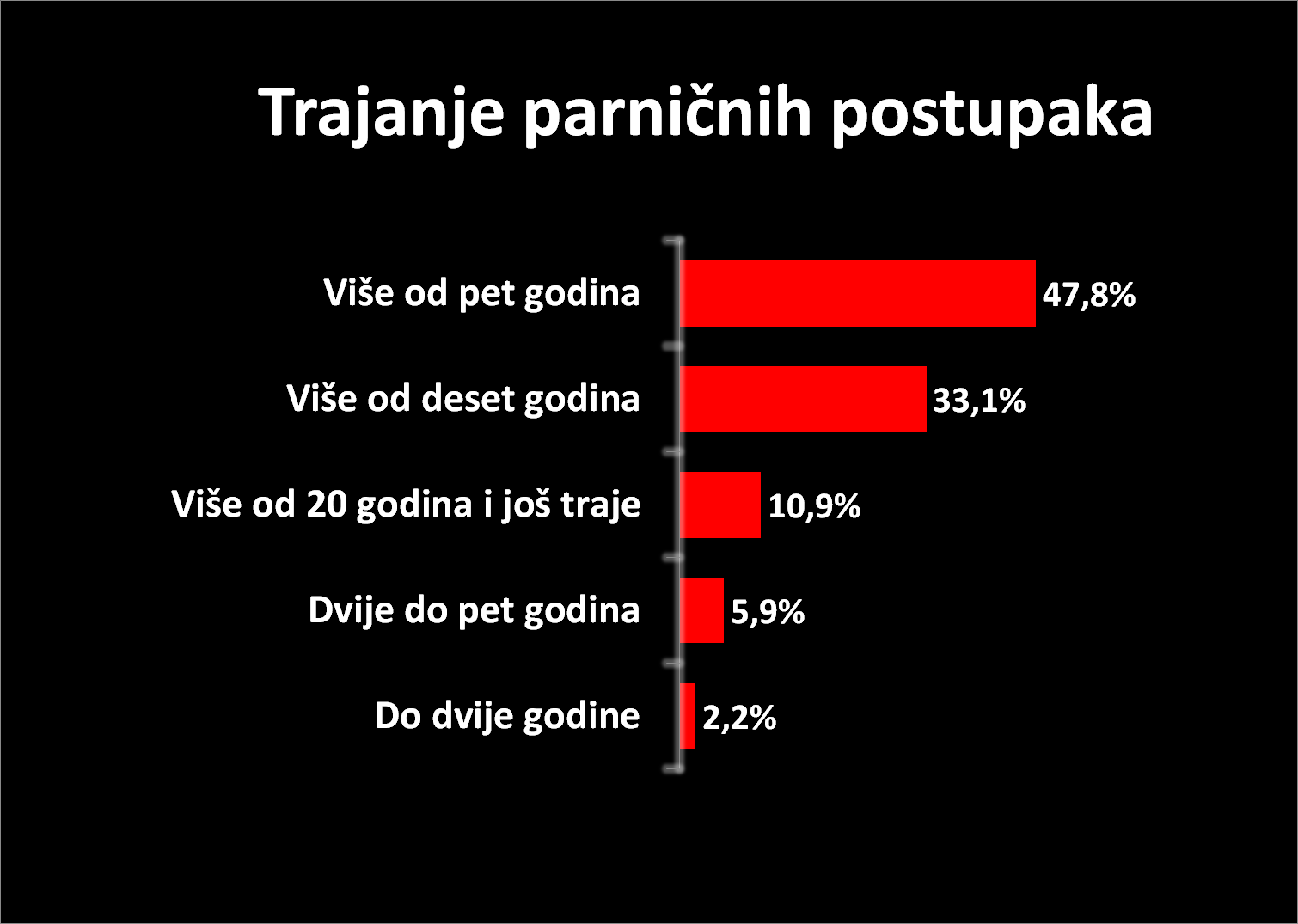
Part of the reason for the great disappointment in the justice system is probably due to the difference between expectations and the reality of the speed and effectiveness of the system. Answers to the question, "How long, in your opinion, can a court proceeding last?" For a reasonable timeline — up to 18 months, voted about 18% of respondents, while only about 1% of respondents agree that a reasonable time frame is over 18 months. The remaining approx. 80% think that the court proceedings should last less than 18 months — of which the most significant number, 54% of them, feel that they should last up to 6 months. Others suggest even shorter deadlines of no more than three months or only a month. From this data, we can see that there is almost no overlap between the periods that entrepreneurs consider necessary and what is happening in reality. There are only 2.2% of processes that last less than two years.
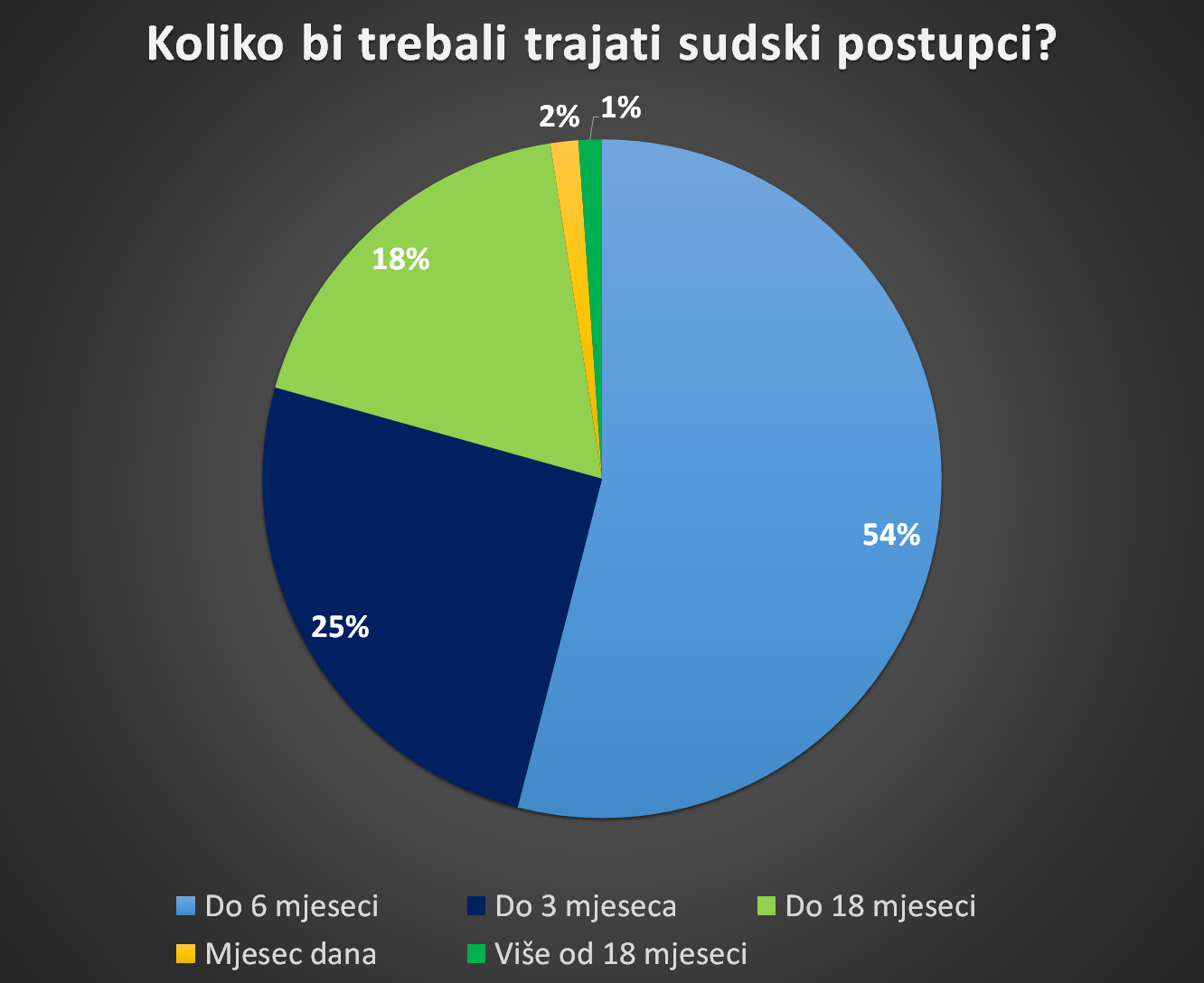
With the question, "What is the Croatian justice system's biggest problem?" we checked why the results are so bad. We got the following answers: Just under 11% think that the reason is a particular element — corruption. About 9% believe that the reason is general inefficiency, and over 3% believe the reasons are political pressures and the slowness that favors the legal framework. Interestingly, less than 2% of respondents added the lack of funds and ignorance, as the answers. We are left with the answer with the highest percentage of votes, more than 70%, which says that all of the above is the cause of the problem and that it makes no sense to single out something individually. According to previous results, a negligible 0.2% believe that there is no problem.
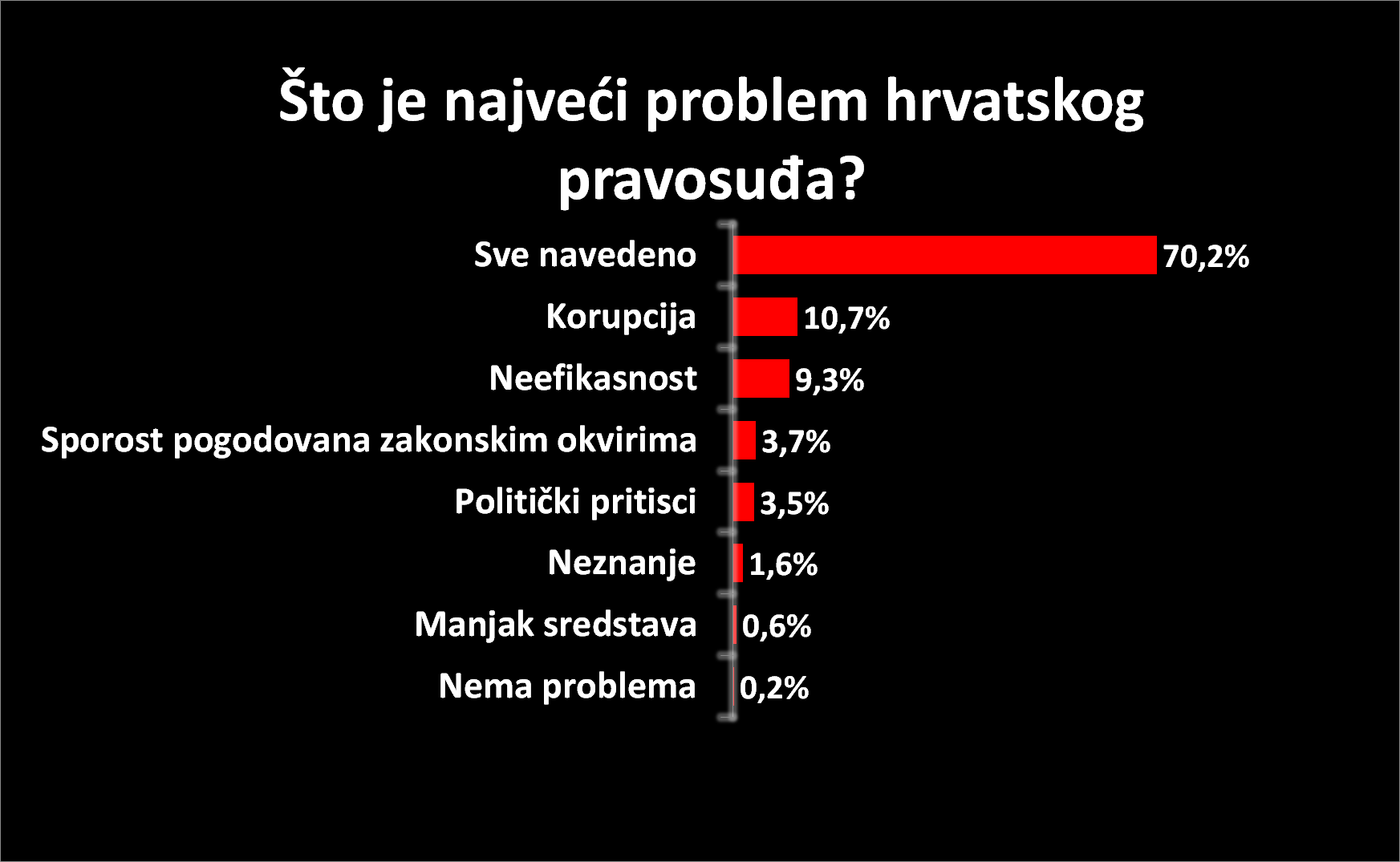
Additional information about a burning issue and what should be addressed first in some reforms, we got with the question, "What should be resolved first in the judicial system?"
Almost 61% of respondents believe that it is corruption. The second answer in size is speed, chosen by about 16% of respondents. About 12% of respondents think that all of the mentioned should be addressed along with many other things.
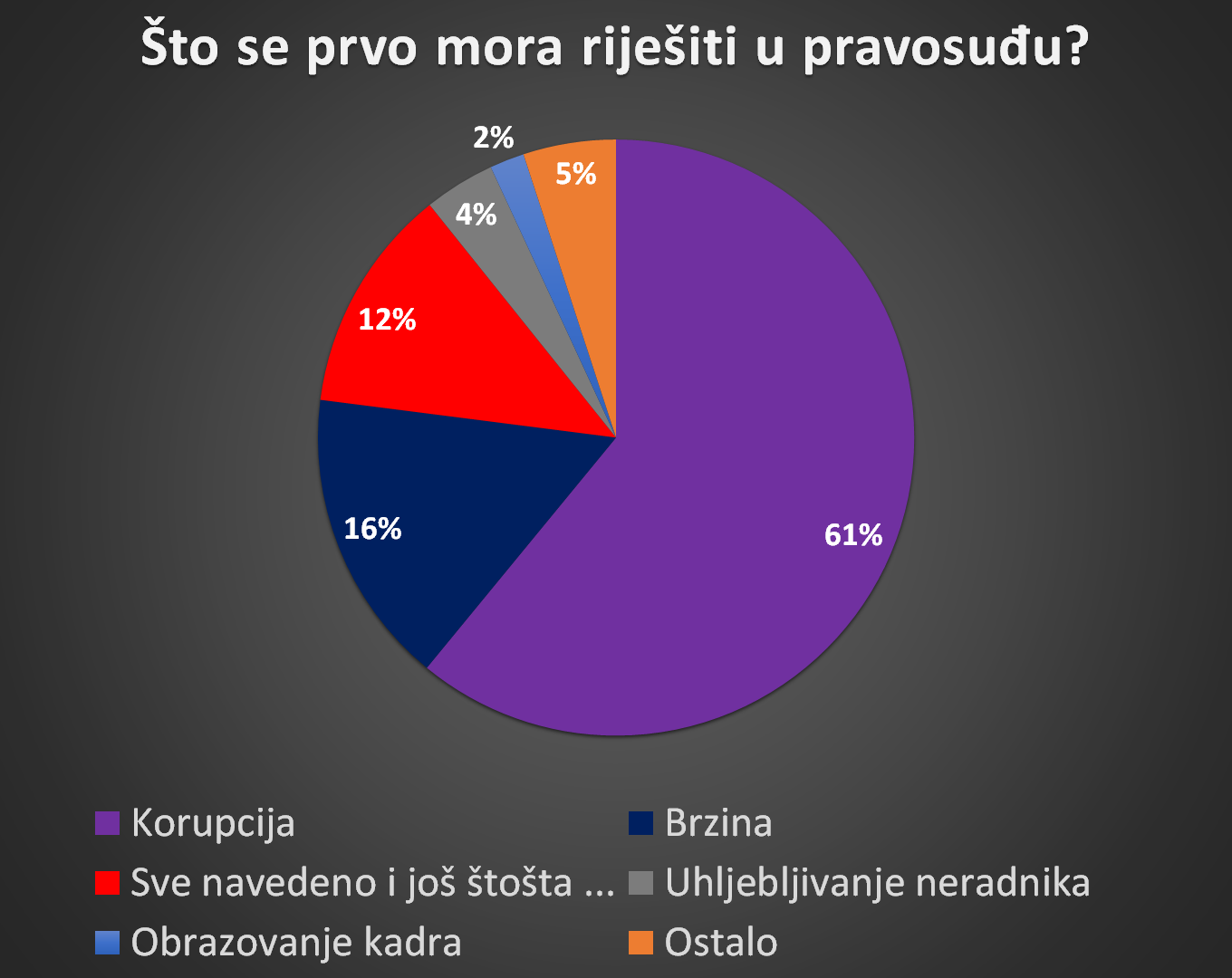
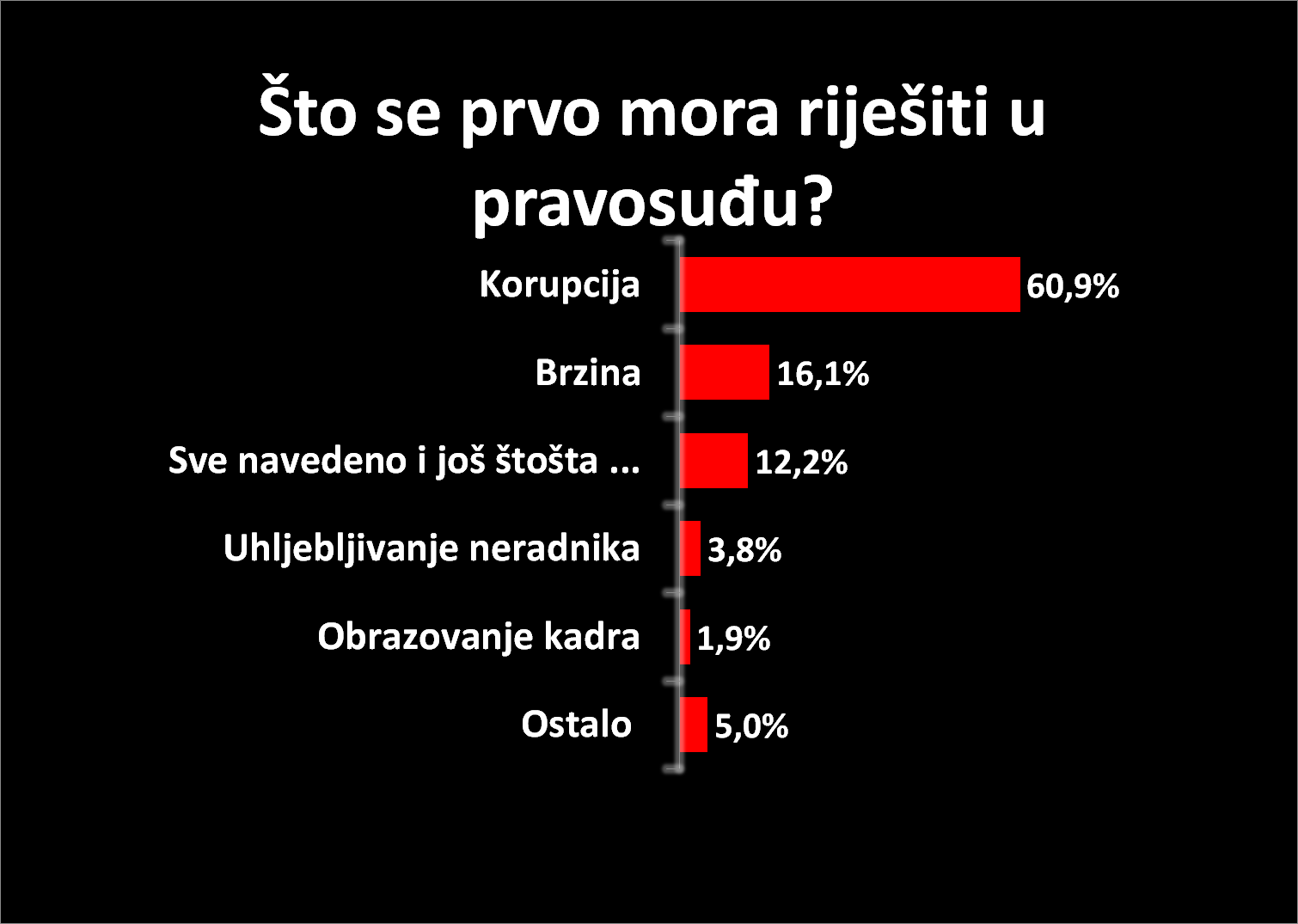
And the last part of the picture of Croatian justice is the perception of whether any changes are taking place. We asked our members if there are any reasons for hope and positivity, "How has the Croatian justice system been in the last few years?" We hoped to find at least the hints of a positive trend. Here are the answers: The most significant number of respondents — almost 58% believe that the condition is nearly as bad, and there are no changes. A great 39.5% believe that even this awful situation is not stable, but rather that things are getting worse and worse. Only 1.3% think that we are making progress, but not enough. And alone again, negligible 0.2% believe that the justice system is getting better and more effective.
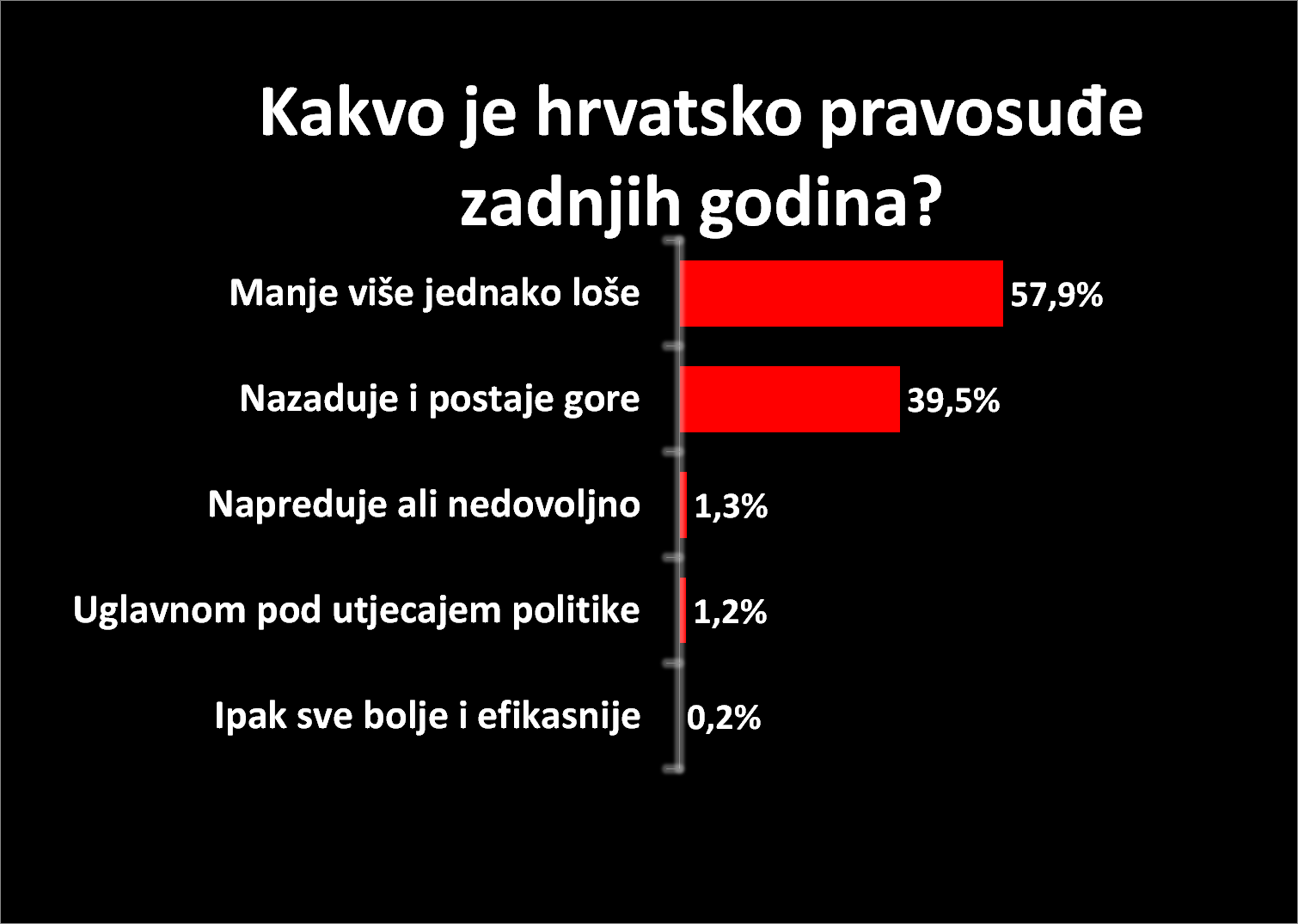
The conclusion is that Croatian entrepreneurs, who barely survive anyway, have very little confidence that the judicial system will help them professionally, objectively, and effectively. Given the speed of activities in the business world, the slowness of the legal system is catastrophic, and fewer people are counting on it. The main problem is corruption, more precisely the perception of corruption in the justice system, and hopelessness because things do not improve, and even go backward from year to year. The examples we got when doing surveys are numerous, and many of them sound unbelievable. For all these reasons, it is clear how the Glas poduzetnika Association will advocate for significant reforms and changes in the judicial system's work. Without it, as an integral part of the reforms that we demand, it will not be possible to ensure prosperity in the state because we want to see Croatia 2.0 as soon as possible!
"Justice system as the gangrene of the Croatia society is a phrase that has been used in the public space ever since the foundation of Independent Croatia. It's been used so much that it has lost its force at the same time, but unfortunately not the meaning and truthfulness.
By everything we've been served for many years, it appears that justice reform is an impossible mission, and the goal may not be easily achievable, but it is feasible. Many states we try to look upon achieved it before us. That cannot be done without a clear plan, decisions, and deadlines for their implementation, which would lead us to open the same subjects on some future elections again. UGP will closely monitor the politicians' work and their public actions to influence the judicial system to stop being mentioned in a negative context." said Hrvoje Bujas, president of the Glas Poduzetnika Association.


